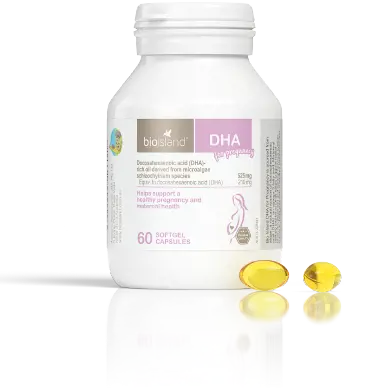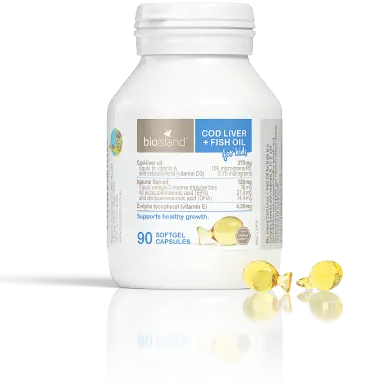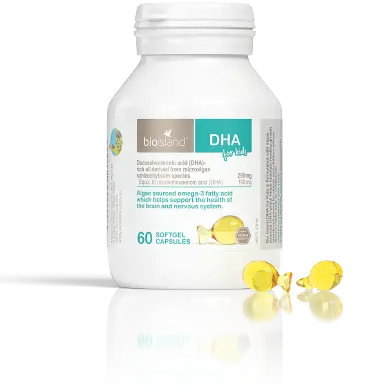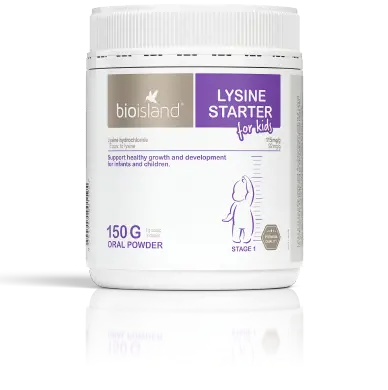
Know you’re A, B, C’s about DHA
DHA is an amazing nutrient needed in the body to help perform certain functions but most importantly for the healthy functioning of the brain.
Child & Baby Health
By Bio Island Nutrition Team
Docosahexaenoic acid or DHA is an essential omega-3 fatty acid that is required in the body for development and function for several body systems and organs.
Absorption:
DHA is an omega-3 fatty acid and generally fat nutrients are best absorbed with a high healthy fat meal. Also, if you are taking a supplement due to a deficiency, it is best to take with a meal to help reduce any side effects than on an empty stomach. Avoid having DHA omega-3 with omega-6, evening primrose oil, pumpkin oil, corn oil or sesame oil as they compete within the body and consequently will cause decreased levels of absorption.
For people who find it hard to not have any side effects from a DHA supplement, having it with a digestive enzyme that contains lipase has found to help reduce the effects or any gastrointestinal disruption. This natural enzyme helps break down fats into smaller, easy to digest molecules that can more easily pass into the bloodstream.
The human body cannot produce DHA in sufficient amounts so therefore it is needed from diet or supplements to achieve suitable amounts. It is naturally found in oily fish such as tuna, herring and cod liver. It is also found in breast milk, algae oil and DHA enriched eggs. It is a key nutrient that is needed in all diets to maintain a healthy brain and overall growth within the body.
Background:
DHA or docosahexaenoic acid as mentioned is an omega-3 fatty acid and is plays an important role in the development of brain function, eyes and nervous system. It is a nutrient required in all stages of life, including unique roles during pregnancy and the first few years of life, where growth and development are taking place.
DHA is a structural fat found in the brain and eye and accounts for 97% of total omega-3 fats in the brain and up to 93% of omega-3 fats in the retina of the eye. In the first few months of infancy higher levels of DHA are needed for the growth of neural cells. It is at this time of development that the neural cells are under constant reconstruction and can be impacted by diet and low nutrient intake. DHA is responsible for helping nerves communicate, sending and receiving signals from the brain to other parts of the body. It is this part of the brain that processes information, emotions, memories, problem solving and behavioural development.
Now when it comes to the eyes and DHA, it is responsible for the communication of images and eye health. DHA in the eye helps activate a protein called rhodopsin. This protein helps the brain receive images from the eyes by altering the membrane absorbency, thickness, fluidity and other properties inside the eye.
Conception & Children:
During pregnancy the mother will provide the required nutrients to help baby grow and develop. It is during these stages where baby is dependent on mum that it is always ideal for the mother to take extra care of her body and what she puts into it. For mum it is essential to increase the daily recommended DHA during pregnancy, as not only does the baby need the nutrients, but the mother will also need her daily recommend amounts of DHA. The RDI for DHA during pregnancy is 115mg per day and during lactation is 145mg per day and as our bodies cannot produce this, we require it from food or supplements (https://www.nrv.gov.au). The support from DHA in helping the mother range from not only personal brain health but also help during pregnancy itself. Research has shown that it may help support with post-natal depression as it is an essential nutrient for the nervous system. It has also been shown in some studies that it may help assist with certain health problems associated with pregnancy, such as preeclampsia.
From birth to 2 years of age the brain is measured to have its primary growth phase and is subject to all nutrients entering the body to help make it a smoother process. It’s this stage where babies and toddlers absorb their surrounding environment and start to develop crucial behavioural reactions. DHA is primarily found in the gray matter of the brain and the frontal lobes particularly during development stages of life. This part of the brain processes information, planning and problem solving and behavioural development.
DHA is an amazing nutrient needed in the body to help perform certain functions but most importantly for the healthy functioning of the brain. Not only will it help assist children but will also provide support in pregnancy and in the later stages of life by building a strong foundation of brain communication in the whole body.
This information does not take into account your personal situation and is general in nature. You should consider whether the information is appropriate for your needs and seek professional medical advice.
Always consult your healthcare professional before taking any supplements or if any concerns arise. Supplements should not replace a balanced diet. 0-6 months exclusive breastfeeding is recommended, please consult your healthcare professional.






